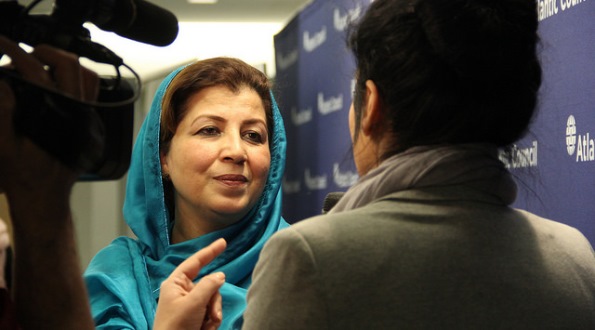BECOME A MEMBER
>JOIN
How Pakistani Women Are Helping Identify and Counter Extremism

Women in Pakistan have successfully organized to help single out potential terrorists and militants in their communities, reports freelance journalist Danielle Shapiro.
As Mossarat Qadeem tells the story, the big clue came from a simple source: a young woman who noticed her brother spending time with strangers.
It was about one year ago in Pakistan’s Khyber Pakhtunkhwa province, formerly called the North-West Frontier province, when the 25-year-old woman noticed a group of men she did not recognize meeting in the evenings in a house on her street. Several young men from her area were attending these meetings, including her 18-year-old brother. Yet her brother wouldn’t tell her what it was all about. His secrecy sparked her suspicion, said Qadeem, founder and executive director of PAIMAN Alumni Trust, an Islamabad-based non-profit that, among other initiatives, works with mothers in some of the country’s most conflict-ridden areas to de-radicalize their sons. Thus far, she said, her organization has turned 455 individuals away from militancy.
The young woman, a member of a local peace group created by PAIMAN called TOLANA, which means “together” in Pashto, asked her male colleagues to investigate. They went to the meetings themselves and learned that the strangers were trying to lure local boys out of the city and into their radical group. TOLANA members then informed the sister and her parents who took the boy to stay with an aunt who lived elsewhere. Their response prevented him from joining the violent ranks of militants wreaking havoc across Pakistan. All because his sister saw some strangers.
“So it was like an early warning for the community that something strange is taking place here,” said Qadeem, who calls her organization’s model of countering extremism an indigenous one, rooted in the local culture and religious traditions. “They all gathered because of the warning of just one woman.”
Qadeem told her story recently while in Washington, D.C. as part of a four-woman delegation from Pakistan here to seek support from U.S. policymakers for their efforts to increase the role of women in initiatives to counter violent extremism. Joining Qadeem were Huma Chughtai, a gender and police reform specialist, Shaista Pervaiz, who represents Punjab province as a member of the ruling Pakistan Muslim League-Nawaz in the National Assembly and is the general secretary of the Women’s Parliamentary Caucus, and Nuzhat Sadiq, a senator in the Pakistani parliament who also represents Punjab province as a member of the Pakistan Muslim League-Nawaz.
The delegates explained that women are critical in fighting extremism precisely because of Pakistan’s conservative social norms and religious customs. These traditions mean that the genders are often segregated and thus women have access to other women in ways that men do not, like being able to enter private homes where females are present. Women are also often the first to see behavioral changes that can be signs of growing militancy in their family members, male and female alike, and women can be particularly effective in building trust between communities and law enforcement.
Strategically, this focus on women makes perfect sense, said Hedieh Mirahmadi, president of The World Organization for Resource Development and Education and a visiting fellow at The Washington Institute for Near East Policy. Mirahmadi testified before the House Foreign Affairs Committee recently on the topic of women’s role in preventing radicalism.
“They are the first line of defense,” she said, noting that women can help disengage relatives from violence or, through their influence within the family, thwart their descent into violence in the first place. “Countering violent extremism, we believe, it’s a prevention framework. So it’s not just the capture-or-kill focus of counter-terrorism. It’s supposed to be a prevention model. So they are part of that early prevention process.” […]
It is also well known that militant groups already include female members and that other women, especially those left bitter from the loss of a loved one, are vulnerable to recruitment, said Haider Mullick, an adjunct professor at the Naval War College in Newport, Rhode Island.
“So I think it makes perfect sense to have more females involved in counter-insurgency,” he said, “especially when we know that a lot of them are already involved in the insurgency side.” […]
While it is perhaps too early to know how the women’s recent week of advocacy will turn into action on the ground, Swanee Hunt, founder and chairperson of Inclusive Security, emphasized the importance of their presence, of their voices being heard, and of the chance it brings for change. […] Hunt, who served as the United States ambassador to Austria from 1993 to 1997, also said that the ways women are fighting back against violent extremism in Pakistan, as part of the police force and without, can be a global model.
“It’s law enforcement but it’s beyond that, it’s what women bring into law enforcement,” she said. “They are disarming extremists with no collateral damage. Unlike a drone attack, which is extremely, extremely expensive, and kills many more innocent than it does the extremists that it’s targeting.
“The basic question is why should we meet murder with murder?” Hunt continued. “When we do that we lose the war and we lose ourselves also, we lose the humanity in ourselves. And that’s what these women understand. So when they go out, someone like Mossarat Qadeem, when she goes out, she is winning back the young men and their mothers. She’s not going out to kill them. So what they’re talking about is transformation. It’s really the most noble form of foreign policy.”
To read the entire article on "Women in the World", please click here.
Photo courtesy by The Institute for Inclusive Security.

